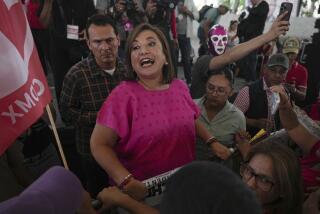Analysis : U.S. Faces Philippine Dilemma It Tried to Avoid
- Share via
MANILA — The uncertain, tainted and still-incomplete results of last week’s election in the Philippines appear to present the Reagan Administration with the very dilemma it had hoped to avoid: a regime with no clear mandate, ruling over a nation polarized into two hostile camps.
In the short run, U.S. diplomats in Manila are working to limit the damage, keeping alive the waning chances of a fair election and urging President Ferdinand E. Marcos and opposition candidate Corazon Aquino to seek national reconciliation instead of confrontation on the streets.
But if Marcos retains power on the basis of an election that many Filipinos reject as illegitimate, President Reagan will again face the problem that the election was intended to resolve: Should the United States try to prop Marcos up--or ease him out?
“Obviously, in the event things do not turn out well, our President is going to have to make some basic decisions,” said Sen. Richard G. Lugar (R-Ind.), chairman of a delegation Reagan sent to observe the election.
U.S. diplomats here and in Washington argue that the Administration is already following a wise middle path, looking for ways to help the Philippines’ economy and political stability while tacitly preparing for a post-Marcos era.
“There will be a very perceptible difference in the quality of our relationship after this election,” predicted one, who refused to be quoted by name.
“What you’re dealing with here is a succession crisis of indeterminate length,” he said. ‘We will have a very strong stake in doing what we can to make sure a viable opposition continues to exist.”
Basic Problems
But several basic problems cloud that picture.
One is that many officials consider Marcos himself to be the heart of the problem in the Philippines, and they say he has resisted U.S. pleas to reform for years.
Another is that despite a reportedly severe kidney ailment, Marcos has expressed no enthusiasm for the advent of a post-Marcos government; he says he intends to serve a full six-year term, until 1992.
Finally, Administration officials say, Reagan has never decided how hard he is willing to put pressure on Marcos--except to reject the idea of forcing him out of office.
Reagan told journalists Monday that he is concerned about charges of fraud in the election but that he will await the advice of the U.S. observer team as well as the judgment of the Philippine people before deciding whether the election was valid.
Regardless of the outcome, he called on Marcos and Aquino to “come together to make sure the government works.”
So far, however, the judgments of the Philippine people and the U.S. observers are only tentative--and may never be conclusive.
Evidence is widespread and credible that Marcos’ formidable political machine bought thousands of votes, struck the names of thousands of opposition voters from registration lists and physically intimidated some opposition campaigners from marshaling their forces on election day.
‘Unknowable’ Answer
But both the Administration and Lugar insist that the key question is whether those abuses changed the outcome of the vote--and that, Lugar said Monday, may be “unknowable.”
Under the circumstances, Aquino has reacted angrily, calling on Marcos to resign and rejecting any form of reconciliation that means accepting an election that she believes was stolen.
In an ominous sign of the violence that lies just below the surface of the political conflict, a young Aquino campaigner was shot to death Monday in Manila after an Aquino rally as he stood atop a van waving a sign that read: “Marcos, Concede.” The identity of the gunman was unknown.
That type of violence is exactly the kind of outcome the Reagan Administration wanted to avoid.
Fears About Future
Before Friday’s election, officials had said they could live with either a clear Marcos victory or a clean win by Aquino. But a tainted Marcos victory, with no clear promise of genuine political, economic and military reforms, prompts some U.S. diplomats to indulge their worst fears: a regime of weakening power and no commitment to reform, a deteriorating economy and a polarized political system producing thousands of recruits for the Communist insurgents, the New People’s Army.
The election--which Marcos aides say was called at Reagan’s behest--was intended to produce a government with new legitimacy. In that, it appears likely to fail.
The United States still has a broad range of options to try to press Marcos toward reform, diplomats say.
It can tie the delivery of military aid to specific improvements in the crony-riddled officers’ corps, such as the retirement of Gen. Fabian C Ver, the army chief of staff, which Marcos promised Reagan last year but has never delivered.
It can adopt a proposal by Sen. John F. Kerry (D-Mass.) to distribute economic aid to the Philippines through a private foundation instead of through Marcos, eliminating, at least theoretically, a source of corruption and power for the regime.
And it can adjust its political support for Marcos himself, attempting to disengage U.S. interests from the man but not from the country.
An immediate test will come soon, as Reagan decides whether to criticize Marcos for electoral abuses and whether to propose increased aid to the Philippines, which he suggested last week if the vote were fair.
Marcos has frequently accused “some elements” of the Administration of seeking his ouster and said he prefers to pay attention only to the word of Reagan.
An abrupt break with Marcos has already been ruled out, diplomats say. Any move that smacked of “abandonment,” said one, “threatens to produce exactly the two things we want to avoid: polarization of the Filipino body politic and a great reinforcement of the position of the extreme left.”
More to Read
Sign up for Essential California
The most important California stories and recommendations in your inbox every morning.
You may occasionally receive promotional content from the Los Angeles Times.














